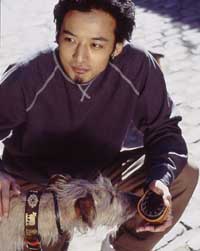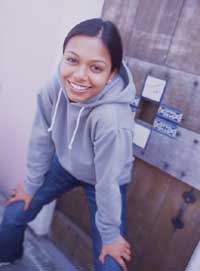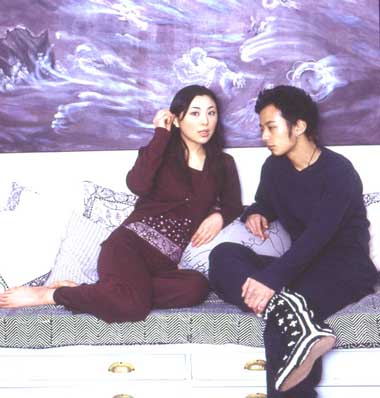
|
   
MAIN PHOTOGRAPH:
People Tree’s latest chevron tops (£29), produced in Swallow,
Bangladesh. ABOVE, FROM TOP: Raglan
sleeve men’s sweat top, and organic cotton sweatshirt made
in India (£22). Deepa blue hoodie, a cotton hooded trainer
made in India. Blue training set. George knit khaki skirt in organic
cotton skirt (£25) and red flint jacket, hand-knitted in Nepal
(£60). BELOW LEFT: Women’s
screen-printed pyjama set in organic cotton, burgundy and navy made
in India (£42) and men's V-neck pyjama set in navy organic
cotton (£32).
|
|
Fair Trade, as a concept, believes that low prices,
lack of market information, design and technical assistance are
major causes of poverty. It pays a minimum price to producers for
their traditional skills. It begins with the producers and their
benefits and not from what Minney terms as 'ego-centric designs
with little consideration as to where the product will be made'.
Opponents say that Fair Trade helps push up wages
and works against free-market principles, insulating producers who
do not share in the equity of the brand to which their efforts contribute.
Minney defends this. 'It is true that the availability of work through
Fair Trade businesses have pushed up wages in rural areas by creating
employment. But when the options for adults and their children are
| People Tree
begins with the producer, based in India, Bangladesh, Zimbabwe,
Kenya, Nepal, Peru and another 12 countries. It seeks to combine
them with consumer-pleasing design. Added to this is the company's
strict environmental policy |
hunger, lack of access to education and health and, in desperation,
they are forced into insecure employment like prostitution, child
labour and exploitation, I reckon that's fine!'
Therefore, People Tree begins with the producer,
based in India, Bangladesh, Zimbabwe, Kenya, Nepal, Peru and another
12 countries. Realizing that many of its poorer producer nations
have traditional skills, it seeks to combine them with consumer-pleasing
design. Added to this is the company's strict environmental policy.
'using organic cotton in 60 per cent of our clothing, and non-carcinogenic
(azo-free) dyes and natural dyes throughout,' said Minney.
It works with 250 producer groups in fashion,
handcrafts and food. 'Most of these suppliers are IFAT
[International Federation for Alternative Trade] members, and all
work to Fair Trade standards,' she explained.
People Tree has grown to four designers (with
Minney at the helm) and 45 Fair Trade staff. She admits that hand-production
does pressure her team, as products are made on hand-looms. Further,
that the company invests a great deal of effort to ensure its strict
environmental standards are met.
However, Minney's design ethos helps when it comes
to the lead times. 'My philosophy is that the clothing should feel
great to wear because it looks good and because it is not laden
with toxic chemicals. It also feels great to know that the shirt
on your back has supported farmers and artisans alike to rebuild
their communities.'
The quality is what has drawn customers to People
Tree in Japan, where she believes people are more convinced by trust,
reputation, design and price than Fair Trade concepts. The Japanese
have a 'deep appreciation of traditional skills like hand-weaving,
natural dyeing and natural farming, and want to revive and promote
these.' A 100 pp. catalogue-magazine covers articles on Fair Trade
and is published three times a year, helping the brand's cause in
Japan.
Her ultimate aim is for People Tree to no longer
be necessary—when all trade will be fair. To do so may require
more companies following an ethical policy globally. Already there
are plenty of movements relating to transparency and integrity—books
such as Beyond
Branding, which the author has co-written—as a backlash
to the era of Wall Street greed. While People Tree will probably still
be needed for years to come, it is refreshing to know that more consumers
are very likely to find favour with its principles. •
Jack Yan is founding publisher of Lucire.
People Tree UK
People Tree Japan
UNEP Sustainable
Consumption

|
